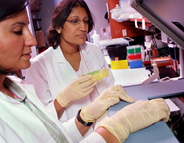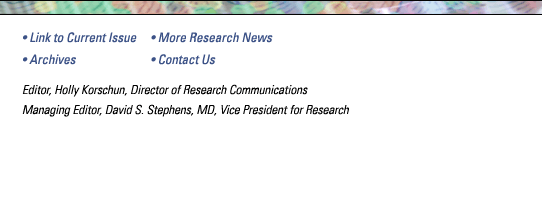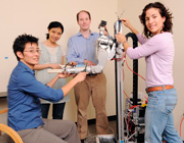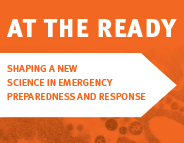 |
 |
|||||||
| October 17, 2011 | Research Extras Read the new issue of Emory Medicine magazine online. Read stories of the amazing men and women who shaped our modern understanding of microbes and infection in the new faculty-authored book, Germ Theory. Learn about a new Pediatric Device Consortium that will engineer medical devices specifically designed for children. Backed by the European Union and Novartis, 42 research institutions (including the Emory Vaccine Center) in 13 countries will collaborate to accelerate vaccine research and development.
|
|||||||
|
Sharon Weiss, MD |
||||||||
Sound Science: Genetic Discovery May Lead to Targeted Treatment of Vascular Tumor |
||||||||
|
(L-R) Lena Ting, Karen Liu, Charlie Kemp, and Madeleine Hackney |
||||||||
| Robots as Rehab Assistants Scientists at Emory and Georgia Tech are developing a "therapeutic robot" to help rehabilitate and improve motor skills in people with mobility problems. The robot will be programmed to interact with humans as an assistant and as a movement therapist. The humanoid assistant could have a long-term impact on quality of life of individuals with movement difficulties due to disease or injury. Read more... |
||||||||
 Pharmacologist Rita Nahta, PhD, (right) and colleague |
||||||||
| Research Funding Tops $511 Million in Health Sciences Researchers at Emory University received $539.7 million from external funding agencies in 2011, with $511.5 million, or 94 percent of the total, in the Woodruff Health Sciences Center. Funded research projects included Parkinson's disease, Crohn's disease, AIDS vaccines, hemorrhagic fevers, clean air, stroke drugs, diabetes, and microneedle patches for flu vaccines. Read more... |
||||||||
| At the Ready: The Science Behind Emergency Preparedness Infectious diseases, natural disasters, and bioterrorism threats remain a global concern of public health and medical scientists and responders. Rollins School of Public Health researchers are growing the science needed to improve community planning and response to disasters and strengthen the public health system. Read more... |
||||||||
|
|
||||||||
| More Obese Americans Suffering from Diabetes Americans are generally living longer, but obese Americans are living fewer of those years without diabetes. A new study points to a prolonged period of life without diabetes for non-obese individuals, but a longer period of health problems for those who are obese. Diabetes incidence in that group also has moved to younger ages over the past 20 years. Read more... |
||||||||
 |
 |
|||||||



